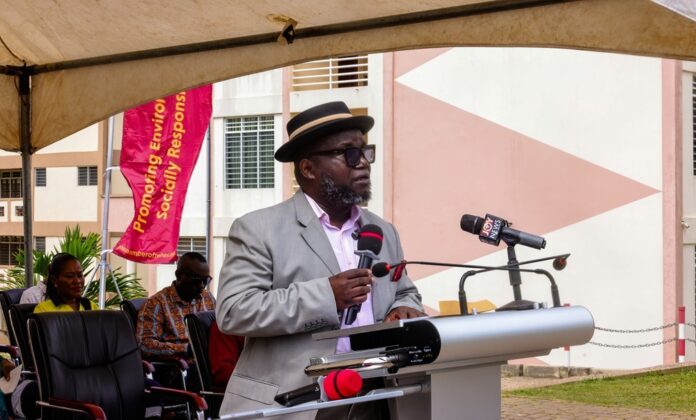The Chief Executive Officer of the Ghana Chamber of Mines, Ing. Dr. Kenneth Ashigbey, has called for a bold national transition from local procurement to large-scale local manufacturing within Ghana’s mining supply chain. He urged government, academia, financiers, and industry players to collaborate in building a globally competitive mining-equipment manufacturing ecosystem.
Speaking at the opening of the 2025 Mining Industry Marketing Expo (MIME) at the University of Mines and Technology (UMaT) in Tarkwa, Ing. Ashigbey emphasised that although Ghana’s mining sector has achieved substantial economic gains over the past decade, the next phase of growth must focus on converting mining-sector demand into industrial capacity.
Citing data from the Minerals Commission, he revealed that mining companies spent about US$3.5 billion on goods and services in 2024, representing more than 49 percent of mineral revenue channelled to local vendors. Chamber records also show that producing members contributed GHS 17.68 billion in taxes and levies, alongside over US$28 million in corporate social investments that year.
He noted that local procurement continues to grow steadily—from US$1.89 billion in 2021, US$2.03 billion in 2022, to about US$2.4 billion in 2023—indicating clear progress in Ghana’s local content agenda.
“The trajectory is unmistakable: Ghana is buying more from Ghana,” he said.
However, Ing. Ashigbey stressed the need to move beyond purchasing locally toward a more ambitious vision.
“Buying bolts and overalls locally is a start; building the factories and technical capabilities to manufacture those bolts and stitch those overalls at scale, competitively, and to export standards is the destination,” he said, adding that mining should serve as an engine for industrialisation rather than simply a channel for distribution.
He outlined a three-part national agenda to transform Ghana into a manufacturing hub for mining inputs:
-
Scale up local manufacturing of high-value components—such as valves, steel parts, HDPE piping, and chemical reagents—through coordinated partnerships involving entrepreneurs, financiers, and global technology providers.
-
Strengthen financing, standards, and testing infrastructure to help Ghanaian firms meet global quality benchmarks and compete for OEM-level contracts.
-
Expand skills development, apprenticeships, and technology transfer in partnership with institutions like UMaT to enable advanced maintenance, rebuilds, and retrofits within Ghana.
Ing. Ashigbey further highlighted mining’s contribution to national financial stability, revealing that the industry repatriated US$4.99 billion through the Bank of Ghana and commercial banks in 2024. Mining companies also sold 358,218 ounces of gold to the Bank of Ghana to support the country’s reserves.
“These figures underscore how responsible mining strengthens Ghana’s financial system,” he stated.
Describing MIME 2025 as a strategic platform, he said the expo links mining companies with suppliers while promoting innovation, collaboration, and opportunities for local industry growth.
“The Chamber stands ready to work with government, academia, civil society, and private partners to convert policy into factories, contracts into careers, and mineral revenue into made-in-Ghana industrial strength,” he said.
He concluded with a call for a national commitment to building a mining sector that “not only mines minerals but forges a nation.”



